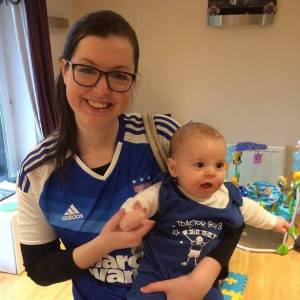
When you know what it is you want from a job, starting a search for work is easy, right?
I mean, you just need to pull together a CV, two minute job, and bang it off to employers?
Sadly not. If you’re anything like me, getting your CV right will be the hardest part of it.
It’s difficult to be positive about your job hunt when you’re starting off with something that makes you feel so negative.
There’s an awful lot of advice available for this, but none of it ever seems to be any help. I’m hoping I can change that.
After I was made redundant from my previous job, I was put in touch with careers advice centre Penna, to help me begin my search for work.
Left reeling from the shock of losing my job when 10 weeks pregnant, I had taken some time out with a trip to Cornwall which helped calm me down and focus my mind.
So, when I went to visit Penna I was filled with nerves about taking a significant step towards moving on from the awful thing that had happened to me.
The two hours I spent with their advisor were unexpectedly helpful to me and so I wanted to share what I learned with you in the hope it might help others.
Maybe even take the pain out of getting out of the starting blocks when writing your CV.
Starting from scratch
Making my way to their offices on the edge of Leeds, I had expectations of talking to someone about looking forward to the future.
I was a little surprised, therefore, to find myself sat at a desk opposite a kindly looking woman being asked to tell her all about my past.
The advisor asked me to talk about each of my positions, as far back as I felt was relevant. For me, that’s the freelance journalist position I had after I finished studying for my Masters.
She patiently listened as I described each of the six jobs I have had since then, making notes as I went along.
Talking to her about all that I had done turned out to be strangely cathartic.
It got me thinking about how much of it had been relevant to the career goals I’d identified in my Post-It note exercise the week before.
So, when I returned home from my meeting, I did the same thing again.
Only this time I typed it out and added more detail: more of the things I had achieved and even the reasons why I left each company.
The result was a Word document almost 3,000 words long, which I still have saved on my computer.
It will never be seen by anyone else, of course, my ‘reasons for leaving’ my job at the restaurant are slightly disparaging of my former managers and as for my redundancy, let’s not go there!
But it’s a good starting off point each team I begin the sole destroying task of re-writing my CV for yet another job application.
Nowadays, I can simply use the most relevant bits for each employer and have a chuckle when I spot the part that says ‘Council Waste Department – General Dogsbody’.
Learning to boast about my ‘Key Skills’
When I’d finished going over my employment history with the Penna careers advisor, she talked me through the highlights that she had picked out.
It was fascinating because she had focused not just on the jobs I had done, but the reasons I had gone for those roles and the things I felt most passionate about while in them.
It was fascinating to see what an outsider had thought of the work I’d done and what I had to offer from those roles.
She had highlighted fourteen ‘key skills’.
Some were obvious. You know, the ones you get bored of typing into your job applications: ‘communication skills’, ‘project management’, ‘building relationships’.
It felt good to hear I would be considered an expert in these areas.
Others were less obvious to others, but they were significant to me: ‘writing’ and ‘social media’.
You will know from my previous blog that these are important to me.
When I was made redundant, I was filled with so much self doubt about my capabilities. This meeting reassured me that my talents had been achieving good things after all.
The advisor also found skills I would never have thought to write down, ones that I knew would look great on my CV: ‘partner working’ and ‘demonstrating and following strategies’.
Of the sixteen key skills I chose five to highlight and focus on, I was pleased to find they fitted closely with my post it note exercise from the year before.
For the sake of offering ideas to others, these are my fourteen key skills and I’ve placed the ones I decided to highlight in bold:
- Building good relationships or ‘partner working’
- Coaching and training
- Communication skills
- Corporate Social Responsibility
- Creativity
- Demonstrating and following strategies
- Planning and organisation
- PR
- Presentations
- Project management
- Researching
- Social media and blogging
- Working independently
- Writing skills

Now give those claims some weight:
When it comes to the ‘Employment history’ section, I find it’s easy to list the ‘day-to-day’ jobs rather than focusing on what I’m good at, what success I have had.
That must be so boring for employers and it doesn’t actually give a sense of how good I am at what you do.
My Penna advisor told me that now I had identified my key skills, I needed to go on and show evidence of them in the jobs that I have done.
The best experts out there pummel it into our heads that CV’s need stats and figures to as evidence and they’re right, it helps to tell a story.
This is where my massive Word document came in handy.
I went through it with a fine toothed comb, making a note of each time I mention anything that demonstrated one of those skills.
‘Partner working’? The time I worked with Tom and Dougie from McFly on a campaign involving their wonderful ‘The Dinosaur That Pooped’ books.
‘Project management’? The courses I took in my own time to allow me to cope better with the workload that came from running sometimes four or five national campaigns at the same time.
‘Social media’? The Christmas campaign I helped run which reached over 15 million people.
Stats and stories to help recruiters build a picture of what it is I have done with my life.

What you enjoy is important too:
I then moved on to the part that I always find a little bit cheesy: ‘hobbies and interests’.
I’ve seen so many CV’s over the years that list ‘going to the cinema’ and ‘spending time with friends’. I confess, I’ve had it on there too. But it really doesn’t say anything about the candidate.
Unless you plan to work in Hollywood, it’s really not that relevant that you like to pop to the Odeon once a month with your bestie.
So, I wanted to make sure this section provided the ‘bigger picture’ of me, the other things I wanted people to know but hadn’t managed to fit in anywhere else.
For me, this bit is obvious: my blog.
Talking about the Diary of a Tractor Girl allows me to, not only show off my talents in writing, but also give a clue to my personality (mum and writer during the week, football hooligan at the weekend!).
In my experience, using Ipswich Town in my CV, the team that I have supported for over 20 years, shows commitment (we’re really not very good), passion and a good work/life balance.
It’s also generally a good conversation starter, the person reading my CV always either supports someone themselves or knows someone else who likes football.
Ask for help:
Once I was happy with my CV, I did what I think is the most important thing for this process: sent it to friends and family for their advice.
I shared it with my best friend who knows me best, in case she could think of anything I’d forgotten (which she did, thanks to her I have added ‘volunteering’ to my hobbies section).
Fresh eyes also help spot mistakes.
I don’t care what recruiters say, bad spelling and grammar isn’t a sign of laziness, it’s a sign of being exhausted from the repetitiveness of filling out CV after CV, application after application.
It’s easy to miss the odd typo or not spot I’ve used ‘there’ instead of ‘their’. Having someone new look over what I’ve written can solve this, so I can only sharing it with others really is key for me.
I also learned that finding friends of friends with relevant skill sets can help and people are generally happy to help by giving your their impression from your CV.
A friend of mine had a friend in HR and another knew someone who worked in the charity field so they both offered to help with looking over my CV.
I was worried about bothering people but was pleasantly surprised to find that most people were flattered I asked for their guidance.
Sharing my CV also taught me to feel proud of it, to feel less nervous of boasting about what I can do and that helped build my confidence when applying for jobs.
At the end of the day, that’s all you really need: confidence and the ability to show it.
| Five things that worked for me… when writing my CV:
1. Start from scratch, don’t use an old version. Open a blank Word document and type about everything you have done. 2. a) While you’re writing, make a note of the things you enjoyed, the things you were good at and the things you want to do more of. Those are your ‘Key Skills’. (N.B. If they match your Post-It note exercise you’re doing it right!) 2. b) Pick five or six of those skills to highlight at the top of your CV. These are the things that you want the employer to notice about you and should match the job descriptions for the roles you’re applying for. 3. Using your Word document, add in detail to prove that you are an expert at each of these skills. Now is the time to impress with your experience. Use statistics and case studies. 4. Make good use of the ‘Hobbies and interests’ section. It’s a chance to tell them more about you, make it interesting and make it relevant to what you do. 5. Now share, share, share. Update your Facebook status telling people you need a fresh pair of eyes, send out a tweet looking for advice. You’ll be surprised how many people want to help. |
Have you got any top tips for writing a CV? What are the best and worst things you’ve read on another person’s CV? I’d love to hear from you so please comment below.
If you’ve enjoyed reading this, I hope you will join me in the rest of my journey. You can be the first to read my next post, the brutally honest jobseeker’s CV, by clicking the ‘Follow’ button.


Great post, thanks for sharing.
A really interesting approach to building a compelling CV, and the steps are useful to keep focus.
It’s one of those things that get neglected until you need or want a new job, so maybe keeping it relevant and updated every few months job seeking or not will make life easier when you need to look for a role.
My CV could certainly do with updating, so will use your tips to help – thanks again!
B.M
LikeLike
Some great tips. I can’t remember the last time I had to write a CV. I’ve been in my job for almost 11 years now! I wouldn’t know where to start if I had to write one now! Thanks for linking up to #ThatFridayLinky
LikeLike
This is so informative. I am currently looking for some part-time work while I study, and your advice has really made me rethink some stuff on CV. I think it would be a good idea to get someone to look over it before I send it out. Would you recommend altering your CV from time to time for different positions, it’s soooo long! lol #ThatFridayLinky
LikeLike
It’s such a frustrating process isn’t it? A comment elsewhere has said it would be so much better if we could focus on selling ourselves and our best bits rather than what the recruiter needs. I have a sort of ‘master copy’ of the CV that I then delete or add relevant bits to as needed.
LikeLike
It’s really nice post for someone who need to write a good CV it’s really helpful. A lot of good tips and I think I will rewrite my CV
#bestandworst
LikeLike
i’m so glad you think it will help!
LikeLike
A really interesting informative post and you got to work with mcfly wow Thanks for linking to the #THAT FRIDAY LINKY come back next week please
LikeLike
This is really useful. I had to write one a year ago and struggled a little as been so long! This process would have really helped. Thanks for sharing with #bestandworst
LikeLike
[…] day I ‘favourite’ the jobs that interest me most, adapt my CV to vague descriptions and try to come up with intriguing cover letters to make myself sound […]
LikeLike
[…] are a useful tool for your job search and, once you have considered the work you want to do and perfected your CV, I’d recommend getting registered with as many as you […]
LikeLike
[…] it were up to me, I’d send every person with qualifications and work experience to the recruitment advisor meeting that I went on after I lost my […]
LikeLike
[…] spoken before about how much I loathe the tiresome, repetitive job of writing my CV, mainly due to the fact applications are so often ignored and no feedback […]
LikeLike